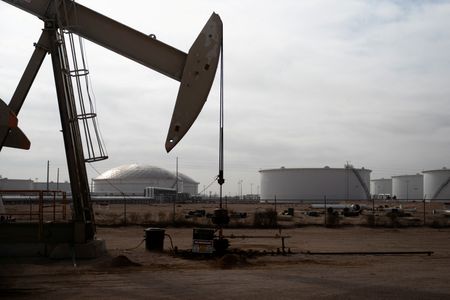By Yuka Obayashi and Michele Pek
SINGAPORE (Reuters) -Oil prices fell for a third straight session on Thursday as unexpected increases in U.S. crude and fuel inventories raised concerns about demand from the world’s largest oil consumer while investors eyed renewed Iran-U.S. nuclear talks.
Brent futures edged 16 cents lower to $64.75 a barrel by 0630 GMT, while U.S. West Texas Intermediate crude weakened 10 cents to $61.47.
Both benchmarks fell earlier in the session after U.S. crude and fuel inventories posted surprise stock builds last week, the Energy Information Administration said on Wednesday, as crude imports hit a six-week high and gasoline and distillate demand slipped. [EIA/S]
Crude inventories rose by 1.3 million barrels to 443.2 million barrels in the week ended May 16, the EIA said. Analysts in a Reuters poll had expected a 1.3 million-barrel drawdown.
“The EIA’s reported surprise stock builds will have a downward pressure particularly on WTI,” said Emril Jamil, a senior analyst at LSEG Oil Research. He added this could further incentivise more U.S. exports to Europe and Asia.
Hiroyuki Kikukawa, chief strategist of Nissan Securities Investment, a unit of Nissan Securities, said: “While rising U.S. inventories have raised concerns, some investors expect the summer driving season starting after Memorial Day weekend to draw down stocks, limiting further downside.”
Both benchmarks lost 0.7% on Wednesday after Oman’s foreign minister said the fifth round of nuclear talks between Iran and the United States will take place on Friday in Rome.
Prices had jumped earlier on Wednesday following a CNN report that U.S. intelligence suggests Israel is preparing to strike Iranian nuclear facilities, although it was not clear whether Israeli leaders have made a final decision.
Iran is the third-largest producer among members of the Organization of the Petroleum Exporting Countries and an Israeli attack could upset supply from the country.
“Traders remain cautious, avoiding large positions as they assess conflicting signals over U.S.-Iran nuclear talks and a media report of potential Israeli strikes on Iranian nuclear facilities,” said Kikukawa.
Priyanka Sachdeva, senior market analyst at Phillip Nova, said: “Additionally, Ukraine suggested that it would seek harsher sanctions on Russia from the EU, which could further disrupt the flow of Russian oil barrels to global markets.”
Ukraine will ask the EU next week to consider big new steps to isolate Moscow, according to a white paper, including seizing Russian assets and bringing in sanctions for some buyers of Russian oil.
(Reporting by Yuka Obayashi and Michele Pek; Editing by Sonali Paul, Jamie Freed and Kate Mayberry)











